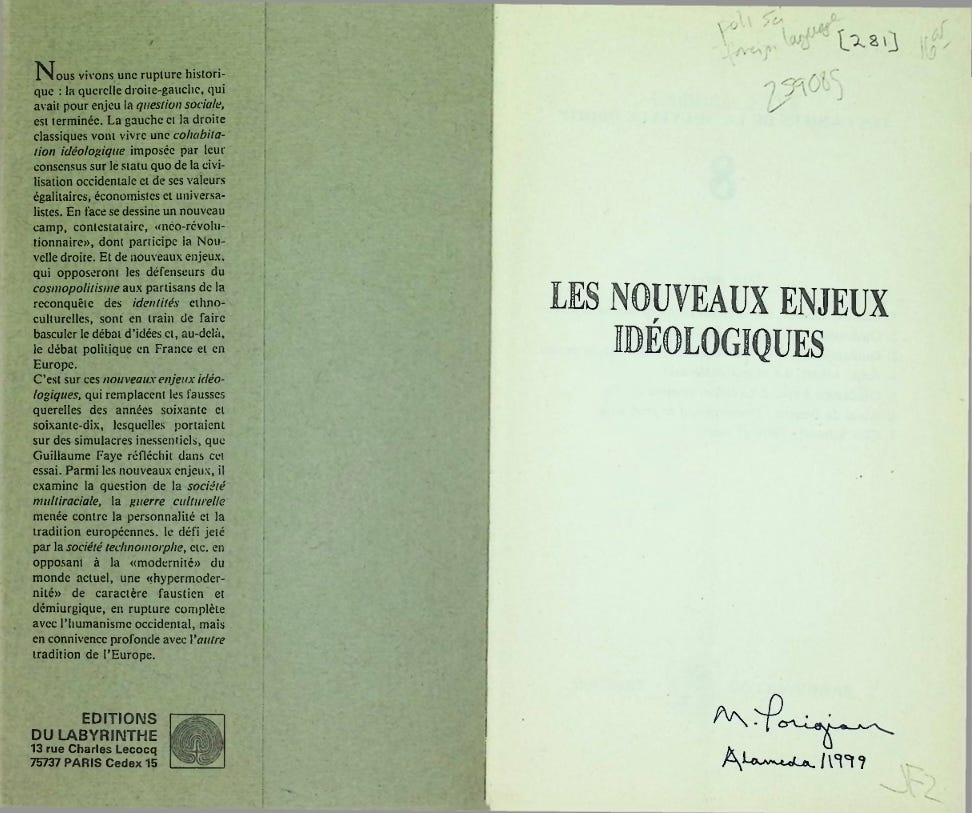Guillaume Faye and the New Ideological Stakes
Here is my review of Guillaume Faye's Les Nouveaux Enjeux Idéologiques (The New Ideological Stakes) (1985)
In this 1985 work, Les Nouveaux Enjeux Idéologiques (The New Ideological Stakes), French New Right theorist Guillaume Faye presents a wide-ranging analysis of what he sees as the key ideological challenges facing European civilization and identity in the late 20th century. He identifies three main threats: multiracial society, the destruction of European cultural traditions, and the impact of modern techno-economic civilization. In this work, we get a sneak peek of what is to come from Faye when he returns to the political scene in the late 1990s.
Faye argues that Europe is experiencing a fundamental historical rupture, where the traditional left-right political divide focused on social issues is being replaced by a new ideological conflict between defenders of cosmopolitanism and those advocating for the preservation of distinct ethnocultural identities. He sees this as the central political battle that will define Europe's future.
On the issue of multiracial society, Faye takes a strongly critical stance, arguing that it inevitably leads to ethnic tensions, cultural dissolution, and what he calls "multiracism." He views mass immigration into Europe as a form of "reverse colonization" (TN: a claim that would later get Faye in trouble for violating “hate speech” laws with his book The Colonization of Europe) that threatens European demographic and cultural survival. Rather than promoting genuine diversity, he contends that multiracial society actually destroys authentic differences between peoples and leads to a homogenized global consumer culture.
The book's second major theme concerns what Faye describes as the "ethnocide" of European peoples through the erosion of their cultural traditions and historical memory. He argues that universalist ideologies derived from Judeo-Christian and Enlightenment thought have undermined Europeans' sense of identity and belonging. Particularly in Germany, he sees a systematic attempt to make Europeans forget or feel guilty about their cultural heritage. The solution, in his view, lies in reconnecting with Europe's pagan, pre-Christian roots.
The third challenge Faye identifies is the impact of modern technology and economic globalization. However, unlike some traditionalist critics, he does not advocate rejecting technological modernity. Instead, he argues that Europeans must "ride the tiger" of technological development while ensuring it serves European identity rather than dissolving it. Technology itself is neutral - what matters is how it is used and directed.
A key theoretical framework Faye employs is the contrast between linear and three-dimensional conceptions of time. He criticizes the progressive, linear view of history inherited from Judeo-Christian thought, which sees the past as dead and superseded. Instead, he advocates what he calls a "tridimensional" view where past, present and future exist in dynamic interaction. This allows tradition to remain as a living force rather than a museum piece.
Throughout the work, Faye emphasizes the need for Europeans to overcome their "civilizational pessimism" and rediscover a sense of historical destiny. He sees the contemporary period as an "interregnum" where old values are dying but new ones have not yet emerged. The task is not to retreat into nostalgia but to carry out a "metamorphosis" that preserves European identity while transforming it.
The book reflects many classic themes of the French New Right - the critique of egalitarianism and universalism, the emphasis on ethnic and cultural identity, and the call for a "new paganism." However, Faye puts his own stamp on these ideas through his focus on technology and we see the birth of his concept of "archeofuturism" which seeks to combine rootedness in tradition with an embrace of the future.
The book raises important questions about how distinct cultural identities can survive in an age of globalization and technological transformation. Faye's emphasis on finding ways to preserve diversity rather than dissolve all differences into a homogeneous consumer culture remains relevant today.
The work is also significant as an artifact of European New Right intellectual history, showing how New Right thinkers attempted to move beyond traditional conservatism while opposing both liberal capitalism and Marxism. Whether one agrees with his conclusions or not, Faye's analysis of the crisis of European identity and civilization merits serious engagement.
In conclusion, Les Nouveaux Enjeux Idéologiques is a brilliant work that combines cultural criticism, philosophical reflection, and political polemic. It raises vital questions about identity, technology, and cultural survival in an increasingly globalized world. The issues it grapples with regarding how to maintain meaningful diversity in the face of homogenizing forces remain highly relevant to today’s world.





